Text
“The conservatives are fools: They whine about the decay of traditional values, yet they enthusiastically support technological progress and economic growth. Apparently it never occurs to them that you can’t make rapid, drastic changes in the technology and the economy of a society without causing rapid changes in all other aspects of the society as well, and that such rapid changes inevitably break down traditional values.”
Ted Kaczynski, Industrial Society and Its Future (1995)
“In a curious paradox, the unrestrained free market capitalism which is threatening the old conservative religious and cultural communities of Protestant America with dissolution is being urged on by the political representatives of those same communities.”
Anatol Lieven, America Right or Wrong (2004)
#ted kaczynski#theodore kaczynski#the unabomber#anatol lieven#authors#american authors#american writer#politics#american politics#conservatives#conservativism#industrialist#industrialism#progressive#liberalism#left wing#anti imperialism#comparison#literature quotes#quotes#political quotes#anti tech#technology#ai#globalism#global politics#american imperialism#economy#capitalism#anti capitalism
1 note
·
View note
Text
“The most oppressed man finds a being to oppress, his wife: she is the proletarian of the proletarian.”
Flora Tristan, “The Emancipation of Woman, or the Testament of the Pariah” (1843)
#sex work#prostitution#forced prostitution#sexploitation#exploitation of women#thank you for adding on to the post <3
2K notes
·
View notes
Text
"The most direct consequence of releasing [more photos of abuse towards prisoners in Abu Ghraib], I believe, would be to further inflamed anti-American opinion and to put our troops in greater danger."
President Barack Obama, 13 May 2009.
I cannot understand how this guy is credited as an amazing president. There should be an "anti-American opinion" when people see those photos, or at the very least an understanding on WHY there is such a strong anti-American opinion globally.
The only country that believes in American exceptionalism is the United States. Most other countries have seen the consequences of this "exceptionalism" because they also experienced U.S. troops brutalizing their people.
#barack obama#president obama#us politics#american politics#world politics#global politics#abu ghraib#abuse of prisoners#abuse of citizens#abuse of power#anti government#anti military#us military#military industrial complex#military intervention#exploitation#sexual violence#sexual abuse#beatings#torture#civilian torture#civilian deaths#american imperialism#us government#american government#politicians#Iraq war#iraq#middle east#george bush
0 notes
Text
Maharaj: True happiness cannot be found in things that change and pass away. Pleasure and pain alternate inexorably. Happiness comes from the self and can be found in the self only. Find your real self (svarupa) and all else will come with it.
Questioner: If my real self is peace and love, why is it so restless?
Maharaj: It is not your real being that is restless, but its reflection in the mind appears restless because the mind is restless. It is just like the reflection of the moon in the water stirred by the wind.
—Sri Nisargadatta Maharaj, I Am That
#sri nisargadatta maharaj#Maharaj#philosophy#philosopher#asian philosophy#indian spirituality#quotes#literature quotes#philosophy quotes#i am that#maurice frydman#nonduality#nondualism#non duality#non dualism
33 notes
·
View notes
Text
“[T]he desire for bliss creates pain. Thus bliss becomes the seed of pain. The entire universe of pain is born of desire. Give up the desire for pleasure and you will not even know what pain is.”
–Sri Nisargadatta Maharaj, I Am That
#Sri Nisargadatta Maharaj#Nisargadatta#nondualism#nonduality#indian philosophy#indian spirituality#Nisarga yoga#guru#spirituality#philosophy#asian philosophy#I am that#Maurice frydman
16 notes
·
View notes
Text
"What does he know of the half-starved wreaths toiling from dawn till dark on the plantations? of mothers shrieking for their children, torn from their arms by slave traders? of young girls dragged down into moral filth? of pools of blood around the whipping post? of hounds trained to tear human flesh? of men screwed into cotton gins to die?"
Harriet Jacobs, Incidents in the Life of a Slave Girl
#incidents in the life of a slave girl#harriet jacobs#slavery#american slavery#abolition of slavery#abolitionist#liberation#liberty#freedom#racism#racism in america#human rights violations#human rights abuses#poc#black academia#black feminism#black liberation#american authors#american literature#literature#literature quotes#race theory#race and gender#race and ethnicity
20 notes
·
View notes
Text
« Books I’ve read in 2024 »
January...
Piercing by Ryū Murakami (184)
Black Skin, White Masks by Frantz Fanon (206)
February...
Death and the Maiden by Ariel Dorfman (68)
Kiss of the Spider Woman by Manuel Puig (281)
April...
Passing by Nella Larsen (128)
May...
A Mercy by Toni Morrison (208)
June...
2666 by Roberto Bolaño (893)
#living post#work in progress#literature#reading#reading list#books#novels#novellas#plays#reading 2024#bookshelf#my bookshelf#hobbies
4 notes
·
View notes
Text
#mary ellen mark#photography#photographer#women in media#exploitation of women#sexploitation#sexual abuse#prostitution#forced prostitution#disociation#abuse#abuse of women#sexual violence#sexual assault#female exploitation#misogyny#sexism
762 notes
·
View notes
Text

Hell‘s Angels: The Strange and Terrible Saga of the Outlaw Motorcycle Gangs, Hunter S Thompson
The mental gymnastics some men go through to condone rape is fucking beyond me.
#what the fuck man#sexism#misogyny#misogyny in literature#misogyny in the media#rape#rape culture#sexploitation
3K notes
·
View notes
Text
"I did not know then how much was ended. When I look back now from this high hill of my old age, I can still see the butchered women and children lying heaped and scattered all along the crooked gulch as plain as when I saw them with eyes still young. And I can see that something else died there in the bloody mud, and was buried in the blizzard. A people's dream died there. It was a beautiful dream. And I, to whom so great a vision was given in my youth, — you see me now a pitiful old man who has done nothing, for the nation's hoop is broken and scattered. There is no center any longer, and the sacred tree is dead."
-Black Elk (Heȟáka Sápa) on the Wounded Knee Massacre.
#indigenous rights#native americans#lakota#black elk#indiginous#native american rights#wounded knee#wounded knee massacre#lakota sioux#sioux#sioux nation#american imperialism#imperialism#atrocities#human rights violations#human rights abuses#indigenous peoples#first nations#anti imperialism#racial and ethnic discrimination#racism in america#racial justice
10 notes
·
View notes
Text
my mom insisted on me changing because I didn't wear a bra with my shirt and I wasn't "thinking about my dad" and his feelings. What the fuck dude
0 notes
Text
“[I]sn’t this fear of rape precisely a call for rape? Just as there are faces that just ask to be slapped, couldn’t we speak of women who just ask to be raped?”
Frantz Fanon, Black Skin, White Masks (1952)
Recently I’ve begun reading Frantz Fanon and found his theory on gender related to race in Black Skin, White Masks (1952) to be disturbing.
He has two chapters in the book I will focus on, one titled “The Woman of Color and the White Man,” the second “The Man of Color and the White Woman.” It should be noted, he does almost exclusively focus on the relations between the black people of Martinique/Antilles and their French colonizers.
“The Woman of Color and the White Man” is extremely prescriptive and critical of black women for their apparent attraction to white men. His point of reference for this is Mayotte Capécia’s I Am a Martinican Woman (1948). Capécia’s work is rampant with colorism and has been widely criticized for its descriptions of internalized black inferiority.
Fanon would describe that “It is commonplace in Martinique to dream of whitening oneself magically as a way of salvation,” and claims that “a lot of girls from Martinique, students in France, [...] confess in lily-white innocence that they would never marry a black man.” Fanon speaks of black women as though they are children, writing in a patronizing tone, “[black Martinican women] too one day will realize that ‘white men don’t marry black women.’” He writes with a tone which conveys that black women are not capable of being attractive. On top of this, his belief seems to be that black women only have one real job, “to whiten the race.”
Fanon is insecure in his manhood and believes he cannot be a complete man as a white man is capable of.
In “The Man of Color and the White Woman,” the descriptions of the black men are far less judgemental. He writes, “between these white breasts that my wandering hands fondle, white civilization and worthiness become mine.” Even if we focused on less sexual descriptions (there are several within the chapter), Fanon wrote, “By loving me, [a white woman] proves to me that I am worthy of white love. I am loved like a white man.”
It is evident that Fanon views women as tools, but their worth differs depending on their race. He claims this is not unique, later in the chapter explaining that “with Antillean men we learned that their main preoccupation on setting foot in France was to sleep with a white woman. [...] this ritual of initiation into ‘authentic’ manhood.”
Black women have the purpose of procreation according to Fanon, while white women have the purpose of sexual pleasure. A black woman cannot be sexually enjoyed, and a white woman cannot mother his children.
#yeah it keeps getting worse#frantz fanon#race theory#race and gender#gender theory#sexism#objectification#misogyny#rape culture
6 notes
·
View notes
Text
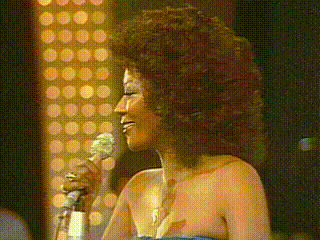

Marlena Shaw, 1977 ♡
731 notes
·
View notes
Text
Recently I’ve begun reading Frantz Fanon and found his theory on gender related to race in Black Skin, White Masks (1952) to be disturbing.
He has two chapters in the book I will focus on, one titled “The Woman of Color and the White Man,” the second “The Man of Color and the White Woman.” It should be noted, he does almost exclusively focus on the relations between the black people of Martinique/Antilles and their French colonizers.
“The Woman of Color and the White Man” is extremely prescriptive and critical of black women for their apparent attraction to white men. His point of reference for this is Mayotte Capécia’s I Am a Martinican Woman (1948). Capécia’s work is rampant with colorism and has been widely criticized for its descriptions of internalized black inferiority.
Fanon would describe that “It is commonplace in Martinique to dream of whitening oneself magically as a way of salvation,” and claims that “a lot of girls from Martinique, students in France, [...] confess in lily-white innocence that they would never marry a black man.” Fanon speaks of black women as though they are children, writing in a patronizing tone, “[black Martinican women] too one day will realize that ‘white men don’t marry black women.’” He writes with a tone which conveys that black women are not capable of being attractive. On top of this, his belief seems to be that black women only have one real job, “to whiten the race.”
Fanon is insecure in his manhood and believes he cannot be a complete man as a white man is capable of.
In “The Man of Color and the White Woman,” the descriptions of the black men are far less judgemental. He writes, “between these white breasts that my wandering hands fondle, white civilization and worthiness become mine.” Even if we focused on less sexual descriptions (there are several within the chapter), Fanon wrote, “By loving me, [a white woman] proves to me that I am worthy of white love. I am loved like a white man.”
It is evident that Fanon views women as tools, but their worth differs depending on their race. He claims this is not unique, later in the chapter explaining that “with Antillean men we learned that their main preoccupation on setting foot in France was to sleep with a white woman. [...] this ritual of initiation into ‘authentic’ manhood.”
Black women have the purpose of procreation according to Fanon, while white women have the purpose of sexual pleasure. A black woman cannot be sexually enjoyed, and a white woman cannot mother his children.
#frantz fanon#race theory#gender theory#race and gender#race and ethnicity#Martinican history#french history#antillean history#sexism#internalized sexism#internalized racism#objectification#stop objectifying women#misogyny#misogynoir#internalized misogyny#misogynistic#cultural misogyny#predjudice#women's liberation#womens studies#womens rights#female exploitation#radfem#radical feminist#radical feminism#libfem#liberal feminism#liberal feminist#intersectionality
6 notes
·
View notes
Text
One of the depressing things about living in Queens is the reality of the high prevalence of prostitution in Jackson Heights.
The worst part of it though is the way locals (people from my neighborhood or neighborhoods nearby) seriously discuss wanting to "pay visits" to these women:
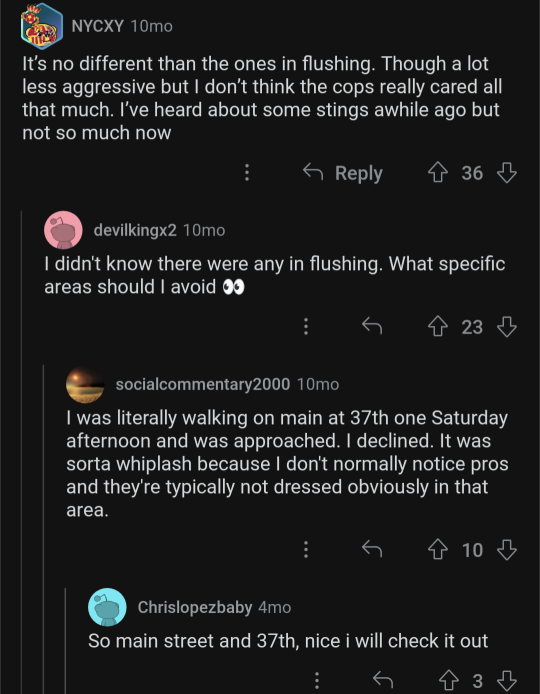
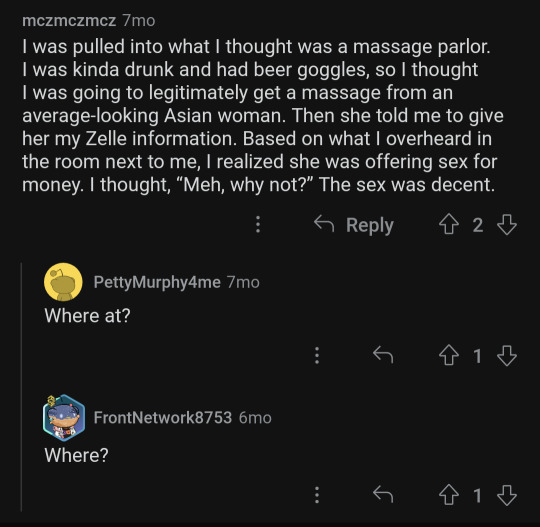

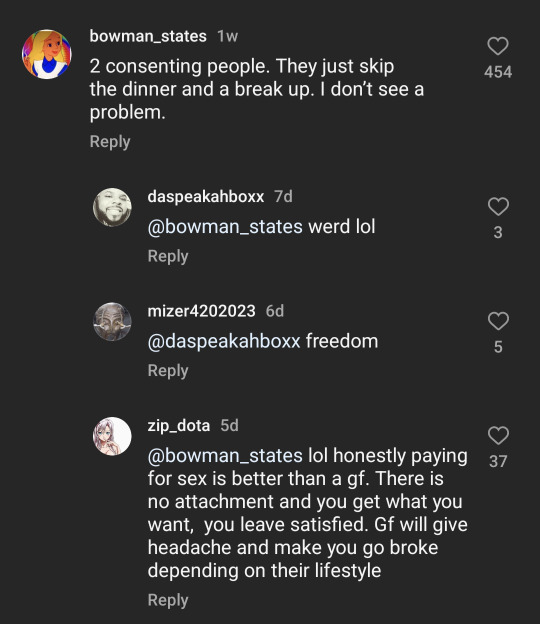




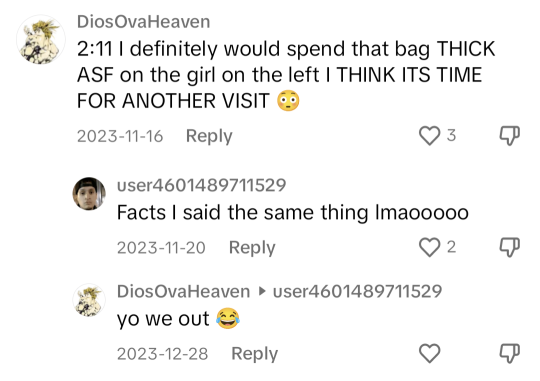

x x x
I honestly wish I could have included more screenshots but all you have to do is check the comments of the links I shared. It's disgusting.
I pass by these women, everyone I know is fully aware of what these women experience. The fact that these women could be trafficked without any police intervention is especially fucked up because of current NYC laws.
I am in no favor of arresting prostitutes. I 100% believe they are victimized by every John and the system which keeps them in the position to prostitute themselves (assuming they are not being pimped). But this system needs to be abolished to prevent these women from being victimized
#male oppression#male violence#trafficking#anti sex trafficking#forced prostitution#prostitution#sex work#anti sex trade#anti sex industry#anti sex work#swerf#queens#NYC#Jackson heights#new york city#new york#queens nyc#female exploitation#exploitation of women#sexual exploitation#exploitation#tw rap3#rape culture#sexual violence#sexual abuse#sexual assault#women#womanhood#streets of nyc#streets of new york
2 notes
·
View notes
Text
Rebel against your slavery to your mind, see your bonds as self-created and break the chains of attachment and revulsion. Keep in mind your goal of freedom, until it dawns on you that you are already free, that freedom is not something in the distant future to be earned with painful efforts, but perennially one's own, to be used! Liberation is not an acquisition but a matter of courage, the courage to believe that you are free already and to act on it.
- Nisargadatta Maharaj
#Nisargadatta Maharaj#India#indian activists#20th century#1900s#guru#liberation#nondualism#hindu#hinduism#philosophy#indian philosophy#indian history#human nature#meditation#asian history#Asian philosophy#quotes#book quotes
264 notes
·
View notes
Text
Why Does He Do That? by Lundy Bancroft
If a man engages in domestic violence but has never hit one of his bosses, he doesn’t have an anger “management” problem, he can manage his emotions just fine, he just thinks it’s morally okay to hit his wife/gf, and or there won’t be consequences for it
#lundy bancroft#why does he do that?#dv#domestic violence#domestic violent relationships#male violence#male partners
2K notes
·
View notes